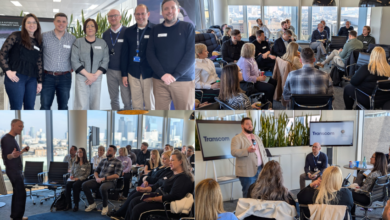
By Aaron Sandeen, VP of Technology Services at Crayon US
As tech transforms business at a breakneck pace, companies are under pressure to stay agile and efficient. But adopting the latest tools isn’t enough to stay competitive—it’s about using technology to streamline operations without adding layers of complexity.
According to McKinsey, about 72% of organizations have already integrated AI into at least one area of their business. Nearly 65% of companies are regularly using generative AI tools, and AI could contribute between $2.6 trillion and $4.4 trillion in annual global corporate profits. In short, AI is moving beyond hype and into mainstream business strategy, and companies that take a practical, data-first approach are seeing tangible benefits.
Flipping the Script from Reactive to Proactive
One of AI’s most promising roles is in transforming reactive strategies into proactive ones. Rather than waiting for a problem to arise, predictive analytics enables companies to spot trends and head off issues before they start. In areas like manufacturing and logistics, predictive maintenance can be a game-changer, identifying equipment issues early to avoid costly failures. According to McKinsey, using predictive maintenance can cut maintenance costs by 30% and reduce unplanned downtime by as much as 50%.
This approach isn’t just for heavy industries. Retailers, for example, are increasingly using AI to forecast demand, manage stock, and even predict what their customers are likely to buy next. Financial services firms use predictive tools to help assess risks and forecast market movements, giving them an edge in decision-making. Across industries, predictive AI offers a way to operate more smoothly, adjust in real-time, and save costs.
Less Guesswork, More Data
When businesses try to analyze mountains of data, they often hit a wall—there’s simply too much information to sift through manually. AI can quickly extract insights from massive datasets, helping businesses identify trends and spot inefficiencies. This is particularly valuable in sectors like finance, where real-time data analysis can provide insights into market conditions, enabling faster, data-driven decisions.
McKinsey’s research indicates that companies effectively leveraging AI for decision-making could see their earnings grow by 5% to 10% annually. Beyond finance, industries such as healthcare and retail are also reaping the benefits. Retailers use AI to optimize pricing, manage supply chains, and personalize customer interactions, while healthcare organizations use predictive analytics to improve diagnoses and outcomes. In all these cases, AI isn’t making decisions on its own but providing businesses with a clear, data-driven roadmap that minimizes risk and maximizes impact.
The Power of AI and Human Collaboration
One of the biggest misconceptions about AI is that it’s meant to replace human workers. In reality, the best results come from a collaboration between AI and human expertise, where each brings unique strengths to the table. AI excels at processing data, recognizing patterns, and handling repetitive tasks at scale, but it lacks the intuition, creativity, and judgment that humans bring to complex problem-solving and strategy.
For instance, in customer service, AI-driven chatbots can handle high volumes of routine queries, allowing human agents to focus on more nuanced interactions that require empathy and critical thinking. This combination of AI handling the basics and humans stepping in for complex issues has proven to improve customer satisfaction and response times. In fact, McKinsey reports that companies leveraging AI in customer service have seen productivity gains of up to 30%.
In creative fields, the combination is equally powerful. Marketing teams, for example, use AI to analyze consumer data and suggest trends, but it’s human creativity that turns these insights into compelling campaigns. AI can support research, testing, and personalization, but humans provide the final touch that resonates with an audience. The AI-human collaboration lets each side do what it’s best at, creating a more effective and agile operation.
Automation Frees Up Human Creativity
Routine, repetitive tasks eat up time and prevent employees from focusing on work that adds real value. Automating these low-value tasks with AI enables teams to focus on what they do best—innovating and solving problems. In customer service, for instance, AI chatbots can handle simple inquiries, letting human agents tackle more complex issues. According to McKinsey, companies using AI for customer service report productivity gains of up to 30%.
But the automation process is not one-size-fits-all. Companies are learning that AI works best when used to complement human capabilities rather than replace them. In the legal sector, for example, AI can analyze documents for relevant information, allowing legal teams to handle higher-level work. The goal isn’t to replace human insight but to make everyday operations more efficient, freeing people to do work that requires creativity, strategy, and judgment.
Ethical and Practical Challenges
AI is not a silver bullet, and deploying it without proper planning can backfire. Concerns around data privacy, bias in algorithms, and transparency are real, and companies need to address them to build trust with customers and partners. For instance, data privacy is a key concern, with nearly 90% of consumers reporting that they are uneasy about how companies handle their data, according to McKinsey. Mishandling data can lead to regulatory issues and customer distrust.
Bias is another challenge. AI algorithms are only as good as the data they’re trained on, and if that data contains biases, the results will reflect them. This can lead to unfair outcomes, especially in areas like hiring and lending. To address these challenges, companies need to put safeguards in place: periodic audits of AI systems, transparency in data usage, and clear ethical guidelines for AI use. In the long term, these safeguards aren’t just about avoiding mistakes—they’re about building trust and credibility in a technology-driven world.
Strategic Imperative
For companies today, AI is less of an optional add-on and more of a fundamental part of business strategy. According to McKinsey, companies that adopt AI at scale are twice as likely to report above-average profitability compared to their peers. Whether it’s predictive analytics, data-driven insights, or automation, AI is reshaping how organizations operate.
In a world where speed and adaptability are critical, AI provides the tools companies need to move quickly without losing precision. Companies that embrace AI strategically, focusing on areas where it drives clear operational value, are setting themselves up not just to survive but to thrive. AI won’t solve every problem, but as it becomes a staple of modern business, the companies that use it wisely will be the ones that define the next era of innovation.




